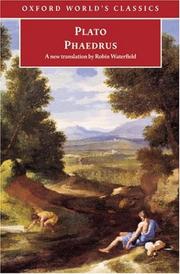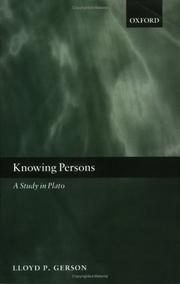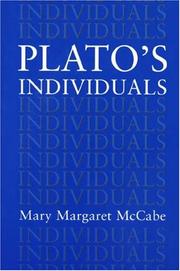| Listing 1 - 9 of 9 |
Sort by
|
Book
Year: 1915 Publisher: Paris, : E. Champoin,
Abstract | Keywords | Export | Availability | Bookmark
 Loading...
Loading...Choose an application
- Reference Manager
- EndNote
- RefWorks (Direct export to RefWorks)
Platao. --- Plato --- Plato --- Plato. --- Manuscripts. --- Manuscripts.
Book
Year: 1947 Publisher: Paris, : Presses Universitaires de France,
Abstract | Keywords | Export | Availability | Bookmark
 Loading...
Loading...Choose an application
- Reference Manager
- EndNote
- RefWorks (Direct export to RefWorks)
Bildersprache. --- Dialectiek. --- Platao. --- Plato, --- Plato. --- Plato. --- Plato. --- Platon. --- Plato.

ISBN: 0191875368 1280374896 0191589535 0585486123 9780585486123 9780191589539 0192802771 9780192802774 9786610374892 6610374899 0199554021 9780199554027 Year: 2019 Publisher: [Oxford] : Oxford University Press,
Abstract | Keywords | Export | Availability | Bookmark
 Loading...
Loading...Choose an application
- Reference Manager
- EndNote
- RefWorks (Direct export to RefWorks)
Phaedrus is widely recognized as one of Plato's most profound and beautiful works. It takes the form of a dialogue between Socrates and Phaedrus and its ostensible subject is love, especially homoerotic love. This new translation is accompanied by an introduction and full notes that discuss the structure of the dialogue and elucidate issues that might puzzle the modern reader.
Love --- Rhetoric --- Filosofia antiga. --- Filosofia grega. --- Kommentar. --- Love. --- Retórica latina. --- Rhetoric. --- Plato, --- Phaedrus, --- PlatÃo, --- SÓcrates,
Book
Year: 1946 Publisher: Paris, : Mellottée,
Abstract | Keywords | Export | Availability | Bookmark
 Loading...
Loading...Choose an application
- Reference Manager
- EndNote
- RefWorks (Direct export to RefWorks)
Platao. --- Plato --- Plato. --- Platon. --- Plato. --- Platon (0427?-0348? av. J.-C.). --- Platon / République. --- Republic (Plato).
Book
ISBN: 1137580437 1137580445 Year: 2016 Publisher: London : Palgrave Macmillan UK : Imprint: Palgrave Macmillan,
Abstract | Keywords | Export | Availability | Bookmark
 Loading...
Loading...Choose an application
- Reference Manager
- EndNote
- RefWorks (Direct export to RefWorks)
This book rethinks Plato’s creation and use of myth by drawing on theories and methods from myth studies, religious studies, literary theory and related fields. Individual myths function differently depending on cultural practice, religious context or literary tradition, and this interdisciplinary study merges new perspectives in Plato studies with recent scholarship and theories pertaining to myth. Significant overlaps exist between prominent modern theories of myth and attitudes and approaches in studies of Plato’s myths. Considering recent developments in myth studies, this book asks new questions about the evaluation of myth in Plato. Its appreciation of the historical conditions shaping and directing the study of Plato’s myths opens deeper philosophical questions about the relationship between philosophy and myth and the relevance of myth studies to philosophical debates. It also extends the discussion to address philosophical questions and perspectives on the distinction between argument and narrative. .
Philosophy.
---
Theater.
---
Philology.
---
Aesthetics.
---
Language and languages
---
Religion
---
Philosophy of Religion.
---
History of Philosophy.
---
Philosophy of Language.
---
Classical Studies.
---
Theatre and Performance Studies.
---
Plato
---
Criticism and interpretation.
---
Beautiful, The
---
Beauty
---
Esthetics
---
Taste (Aesthetics)
---
Dramatics
---
Histrionics
---
Professional theater
---
Stage
---
Theatre
---
Mental philosophy
---
Aflāṭūn
---
Aplaton
---
Bolatu
---
Platon,
---
Platonas
---
Platone
---
Po-la-tʻu
---
Pʻŭllatʻo
---
Pʻŭllatʻon
---
Pʻuratʻon
---
Πλάτων
---
אפלטון
---
פלאטא
---
פלאטאן
---
פלאטו
---
أفلاطون
---
柏拉圖
---
플라톤
---
Platon
---
Platoon
---
Philosophy (General).
---
Linguistics
---
Philosophy
---
Art
---
Criticism
---
Literature
---
Proportion
---
Symmetry
---
Performing arts
---
Acting
---
Actors
---
Humanities
---
Psychology
---
Religion—Philosophy.
---
Language and languages—Philosophy.
---
Plato.
---
Dialogues (Plato)
---
Aristokles
---
Eflātun
---
Eflatun
---
Platonius
---
Platão
---
Platōnas
---
Pseudo-Plato
---
Platao
---
Po-la-t'u
---
P'urat'on
---
P'ullat'o
---
P'ullat'on
---
Ps.-Platon
---
Pġaton
---
Aflaṭôn
---
Aplaṭôn
---
Aflāṭūn
---
Platōn
---
Pseudo-Platon
---
プラトーン
---
Պղատոն
---
פלטו
---
Philosoph
---
Athen
---
Beurer, Johannes Jakob
---
Vietor, Theodor
---
Cornarius, Janus
---
Gessner, Conrad
---
Serres, Jean <
Book
ISBN: 1474254209 1474254187 1474254195 9781474254199 9781474254182 9781474254175 9781474254205 1474254179 9781474254175 9781474254205 Year: 2017 Publisher: London : Bloomsbury Academic,
Abstract | Keywords | Export | Availability | Bookmark
 Loading...
Loading...Choose an application
- Reference Manager
- EndNote
- RefWorks (Direct export to RefWorks)
"When was photography invented? In 1826 with the first permanent photograph? If we depart from the technologically oriented accounts and consider photography as a philosophical discourse an alternative history appears, one which examines the human impulse to reconstruct the photogogic or "the evoking of light". The significance of the photagogic throughout the history of ideas is explored via the Platonic Dialogues, Iamblichus' theurgic writings, Marsilio Ficino's texts and the works of Renaissance magus John Dee. This alternative history is not a replacement of other narratives of photographic history but rather offers a way of rethinking photography's ontological instability."--Bloomsbury Publishing.
Photography
---
Lighting
---
History.
---
Lighting.
---
Ficinus, Marsilius
---
Iamblichus
---
Plato
---
Aristokles
---
Eflātun
---
Eflatun
---
Platonius
---
Platão
---
Platōnas
---
Platonas
---
Pseudo-Plato
---
Platao
---
Po-la-t'u
---
Bolatu
---
P'urat'on
---
P'ullat'o
---
P'ullat'on
---
Ps.-Platon
---
Pġaton
---
Aflaṭôn
---
Aplaṭôn
---
Aflāṭūn
---
Platōn
---
Platon
---
Platone
---
Pseudo-Platon
---
プラトーン
---
Պղատոն
---
أفلاطون
---
柏拉圖
---
פלטו
---
פלאטו
---
פלאטאן
---
Philosoph
---
Athen
---
Beurer, Johannes Jakob
---
Vietor, Theodor
---
Cornarius, Janus
---
Gessner, Conrad
---
Serres, Jean <

ISBN: 9780199288670 9780199257638 0199288674 0199257639 0191717789 9786610756230 0191531537 1280756233 1429422092 Year: 2003 Publisher: Oxford ; New York Oxford University Press
Abstract | Keywords | Export | Availability | Bookmark
 Loading...
Loading...Choose an application
- Reference Manager
- EndNote
- RefWorks (Direct export to RefWorks)
"Knowing Persons is an original study of Plato's account of personhood. For Plato, embodied persons are images of a disembodies ideal. The ideal person is a knower. Hence, the lives of embodied persons need to be understood according to Plato's metaphysics of imagery." "For Gerson, Plato's account of embodied personhood is not accurately conflated with Cartesian dualism. Plato's dualism is more appropriately seen in the contrast between the ideal disembodied person and the embodied one than in the contrast between mind or soul and body." "This study argues that Plato's analysis of personhood is intended to cohere with his two-world metaphysics as well as a radical separation of knowledge and belief. Gerson demonstrates that Plato's account of persons plays a key role not just in his theory of mind, but in his theory of knowledge, his metaphysics, and his ethics. A proper understanding of Plato's account of persons must therefore place it in the context of his doctrines in these areas. Knowing Persons fills a significant gap by showing the way to such an understanding."--Jacket.
Persons. --- Personnes --- Plato. --- Individuals (Persons) --- Individus (Personnes) --- Individuën (Personen) --- Personen --- Persons --- People --- Individualism --- Human beings --- Personality --- Philosophical anthropology --- Plato --- Platon --- Platone --- Platoon --- Erkenntnistheorie. --- Existência. --- Filosofische antropologie. --- Gemeinschaft. --- Individuum. --- Kennistheorie. --- Metafysica. --- Metafísica. --- Metaphysik. --- Ontologia. --- Personnes. --- Persoon. --- Philosophische Anthropologie. --- Plato, --- Platon. --- PlatÃo, --- Aflāṭūn --- Aplaton --- Bolatu --- Platonas --- Po-la-tʻu --- Pʻŭllatʻo --- Pʻŭllatʻon --- Pʻuratʻon --- Πλάτων --- אפלטון --- פלאטא --- פלאטאן --- פלאטו --- أفلاطون --- 柏拉圖 --- 플라톤 --- Платон --- プラトン

ISBN: 0691029393 Year: 1999 Publisher: Princeton, N.J. Princeton Univ. Press
Abstract | Keywords | Export | Availability | Bookmark
 Loading...
Loading...Choose an application
- Reference Manager
- EndNote
- RefWorks (Direct export to RefWorks)
Contradicting the long-held belief that Aristotle was the first to discuss individuation systematically, Mary Margaret McCabe argues that Plato was concerned with what makes something a something and that he solved the problem in a radically different way than did Aristotle. McCabe explores the centrality of individuation to Plato's thinking, from the Parmenides to the Politicus, illuminating Plato's later metaphysics in an exciting new way. Tradition associates Plato with the contrast between the particulars of the sensible world and transcendent forms, and supposes that therein lies the center of Plato's metaphysical universe. McCabe rebuts this view, arguing that Plato's thinking about individuals--which informs all his thought--comes to focus on the tension between "generous" or complex individuals and "austere" or simple individuals. In dialogues such as the Theaetetus and the Timaeus Plato repeatedly poses the question of individuation but cannot provide an answer. Later, in the Sophist, the Philebus, and the Politicus, Plato devises what McCabe calls the "mesh of identity," an account of how individuals may be identified relative to each other. The mesh of identity, however, fails to explain satisfactorily how individuals are unified or made coherent. McCabe asserts that individuation may be absolute--and she questions philosophy's longtime reliance on Aristotle's solution.
1 <38> PLATO
---
Individuation (Philosophy)
---
Individuals (Philosophy)
---
Individuation
---
Particulars (Philosophy)
---
Philosophy
---
Haecceity (Philosophy)
---
Griekse filosofie--PLATO
---
Plato
---
-Aflāṭūn
---
Aplaton
---
Bolatu
---
Platon,
---
Platonas
---
Platone
---
Po-la-tʻu
---
Pʻŭllatʻo
---
Pʻŭllatʻon
---
Pʻuratʻon
---
Πλάτων
---
אפלטון
---
פלאטא
---
פלאטאן
---
פלאטו
---
أفلاطون
---
柏拉圖
---
플라톤
---
Contributions in concept of individuation
---
-Contributions in concept of individuation
---
1 <38> PLATO Griekse filosofie--PLATO
---
Aflāṭūn
---
Contributions in concept of individuation.
---
Platon
---
Platoon
---
Платон
---
プラトン
---
Plato.
---
Recollection.
---
accident.
---
affinity.
---
austere individuals.
---
being.
---
bundles.
---
change.
---
complex entities.
---
compresence of opposites.
---
cosmology.
---
dialectic.
---
dialogue form.
---
difference.
---
empiricism.
---
essence.
---
explanation.
---
generous individuals.
---
grammatical prejudice.
---
identity.
---
ignorance.
---
interpredication.
---
knowledge.
---
language.
---
lumps.
---
methods of philosophy.
---
natures.
---
one over many.
---
perception.
---
properties.
---
relations.
---
sameness.
---
separation.
---
soul.
---
stuff.
---
teleology.
---
transcendence.
---
understanding.
---
unity.
---
universals.
---
values.
---
variables.
---
wholes.
---
Individuation.
---
Metaphysik.
---
Individualität.
---
Plato,
---
Individuum
---
Prima Philosophia
---
Philosophie
---
Theoretische Philosophie
---
Erste Philosophie
---
Metaphysikkritik
---
Werden
---
Selbstwerdung
---
De-Individuation
---
Aristokles
---
Eflātun
---
Eflatun
---
Platonius
---
Platão
---
Platōnas
---
Pseudo-Plato
---
Platao
---
Po-la-t'u
---
P'urat'on
---
P'ullat'o
---
P'ullat'on
---
Ps.-Platon
---
Pġaton
---
Aflaṭôn
---
Aplaṭôn
---
Aflāṭūn
---
Platōn
---
Pseudo-Platon
---
プラトーン
---
Պղատոն
---
פלטו
---
Philosoph
---
Athen
---
Beurer, Johannes Jakob
---
Vietor, Theodor
---
Cornarius, Janus
---
Gessner, Conrad
---
Serres, Jean <
Book
ISBN: 9783515128599 9783515128643 3515128646 351512859X Year: 2021 Volume: 125 Publisher: Stuttgart : Franz Steiner Verlag,
Abstract | Keywords | Export | Availability | Bookmark
 Loading...
Loading...Choose an application
- Reference Manager
- EndNote
- RefWorks (Direct export to RefWorks)
Nach vorherrschender Meinung veranschaulicht Platon im Gorgias die Wirkungslosigkeit der Sokratischen Gesprächsmethode, da er Sokrates vor allem heftige Vorwürfe und Spott ernten lässt.Bernhard Kaiser argumentiert hingegen dafür, die emotionalen Reaktionen als Indikator zu werten, dass die Gesprächspartner wirksam in ihrem Selbstverständnis erschüttert werden. Sokratesˈ Vorgehen ist in Analogie zur medizinischen Behandlung als Seelentherapie konzipiert, wobei der Akzent der Darstellung auf dem Schmerz liegt, den die Behandlung häufig mit sich bringt. Die verbalen Angriffe gegen Sokrates lassen sich somit als Abwehrreaktionen auf die unangenehmen Begleiterscheinungen der psychischen Transformationsprozesse lesen, die durch die argumentativen Widerlegungen eingeleitet werden.Die Einbettung der Konfliktsituationen in das Handlungsgeschehen bietet zugleich die Gelegenheit, die therapeutischen Tugenden des Sokrates unter Beweis zu stellen: Platon lässt ihn im Interesse der Gesprächspartner stets besonnen reagieren und unerschrocken gegen die Widerstände ankämpfen. Die erhobenen Vorwürfe erweisen sich dabei als unzutreffend. Kaiser arbeitet insbesondere heraus, dass Sokrates auf den Gebrauch der eironeia verzichtet.
Platon (0427?-0348? av. J.-C.).
---
E-books
---
Ressentiment
---
Dialog
---
Plato
---
Socrates
---
Gorgias
---
(Produktform)Electronic book text
---
Sokratische Methode
---
Straftheorie
---
Therapeutische Tugend
---
Therapiemethode
---
Wahrhaftigkeit
---
Widerlegung
---
Wohlwollen
---
agonal
---
Behandlungsschmerz
---
Beschämung
---
Besonnenheit
---
Dialektik
---
Eironeia
---
Elenchos
---
Elenktik
---
Emotionen
---
Eristik
---
Gerechtigkeit
---
Gerichtsmetaphorik
---
Kognitive Dissonanz
---
Medizinanalogie
---
Ordnung der Seele
---
Parrhesie
---
Rhetorik
---
Richter
---
Scham
---
Schlussmythos
---
Seelenheilung
---
Sokratische Ironie
---
Agon
---
Altphilologie
---
Antilogik
---
Apologie des Sokrates
---
(VLB-WN)9567
---
Zwiegespräch
---
Dialoge
---
Dialogue
---
Wechselrede
---
Gespräch
---
Vorurteil
---
Gorgias Leontinos
---
Gorgias Leontinus
---
Leontinus, Gorgias
---
Gorgias von Leontinoi
---
Gorgia
---
Gorgia di Lentini
---
Gorgia da Lentini
---
Gorgios
---
Georgias
---
Philosoph
---
Redner
---
Rhetor
---
v480-v380
---
v05
---
-v04
---
-Aristokles
---
Eflātun
---
Eflatun
---
Platonius
---
Platão
---
Platōnas
---
Platonas
---
Pseudo-Plato
---
Platao
---
Po-la-t'u
---
Bolatu
---
P'urat'on
---
P'ullat'o
---
P'ullat'on
---
Ps.-Platon
---
Pġaton
---
Aflaṭôn
---
Aplaṭôn
---
Aflāṭūn
---
Platōn
---
Platon
---
Platone
---
Pseudo-Platon
---
プラトーン
---
Պղատոն
---
أفلاطون
---
柏拉圖
---
פלטו
---
פלאטו
---
פלאטאן
---
Athen
---
Beurer, Johannes Jakob
---
Vietor, Theodor
---
Cornarius, Janus
---
Gessner, Conrad
---
Serres, Jean <
| Listing 1 - 9 of 9 |
Sort by
|

 Search
Search Feedback
Feedback About
About Help
Help News
News